One of the greatest gifts my dad gave me was an appreciation – a passion – for friendship.
I watched him invest, intentionally, in growing and maintaining a cadre of friends from all parts of his life. Eight years after he left us, I still work to stay in touch with the guys that remain – his childhood buddies I see at our cabin every hunting season, fraternity brothers I banter with on Facebook, even his work friends from the bank, whose in-person fantasy football draft I attend like clockwork. Each group shrinks a little every year, but I cling to them, if only because it allows me to stay connected to my dad, to feel like a central part of him is still alive.
I similarly invest in my own friendships – my “chosen families” – from every stretch of road along the highway. Maddie and Noelle laugh at how many people I refer to as “my best friend.” But really, how can you rank true friends, when each is so unique?
My best friends pick me up when I’m sinking. More often, they knock me down several pegs when my ego needs it. I say “I love you” at the end of every encounter, so habitually that I’ve accidentally said it to random customer service reps and work contacts at the end of a call. Awkward.
I don’t see any of my friends as often as I’d like. The extent to which it’s my fault weighs on me, even though – or because – I know they understand.
So, I was heartbroken to read this new study, showing how dramatically friendships have declined since the pandemic, and its drag on our well-being. Quarantine is the obvious culprit, but our divisive politics probably had a non-trivial effect. It’s impacted women more than men and young people more than old, though men and Baby Boomers are more likely to say they have no friends at all.
One of the stark, yet intuitive, correlations is work status. Fully remote workers are 50% more likely than in-person workers to have lost friends since COVID. We’ll likely never require people to return to the office – the flexibility of remote work, particularly for working parents, is too beneficial. It doesn’t mean there aren’t huge tradeoffs.
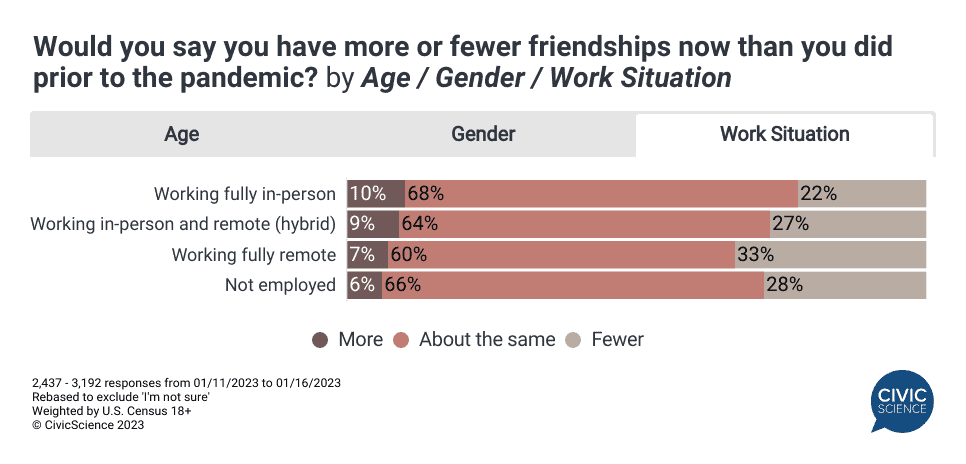
As someone who formed some of his most coveted friendships at work, I wish young remote workers knew how much they’re missing. Good friendships, formed early, compound and amortize forever.
Whether people eventually wander back into the office or find new avenues to make and sustain deep friendships, I hope this trend is only a blip.
Friends are priceless.
Here’s what we’re seeing:
Consumer confidence had its first downturn (albeit a tiny one) since last October, which is exactly what we told you would happen. Our Economic Sentiment Index fell a wee 0.3 points over the past two weeks, ending a long run of improvement. As expected, the resiliency of consumers through the holiday retail season caught up to them once those credit card and heating bills arrived in the mail. While inflation is slowing, it’s not reversing, and bank accounts only deal in real-time. Confidence in major purchases, home-buying, and the job market all dipped as a result. If there’s a silver lining, a consumer pullback should slow inflation even further. Rising optimism for the economy was a notable bright spot.
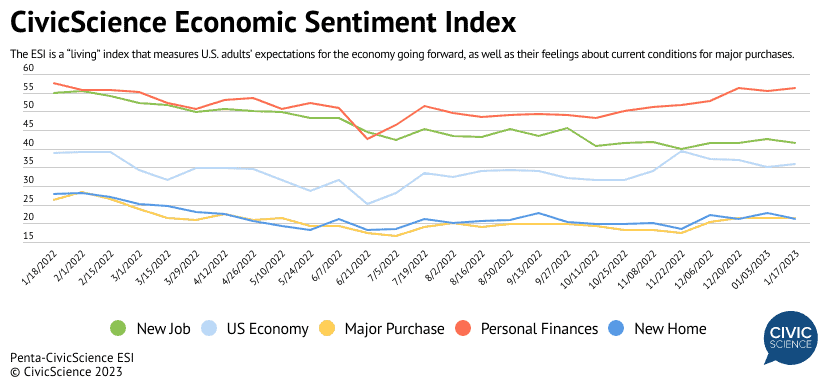
The importance of company values – at least in terms of driving consumer behavior – is in decline. To be clear: THIS DOES NOT MEAN YOU SHOULD RECONSIDER YOUR COMMITMENTS TO ESG! If you were only doing those things to make more money, shame on you anyway. That said, it should come as no surprise that when household budgets tighten, people care less and less about the intrinsic benefits of buying from one place over another. The number of consumers who say brand social consciousness is “very important” to them has fallen 1 percentage point since this time last year and 9 points since the George Floyd crisis in 2020. Just keep in mind that 73% of consumers still care about these things at least “somewhat.” Among those who do care, brand trust, transparency, and how a company treats its employees are the top concerns.
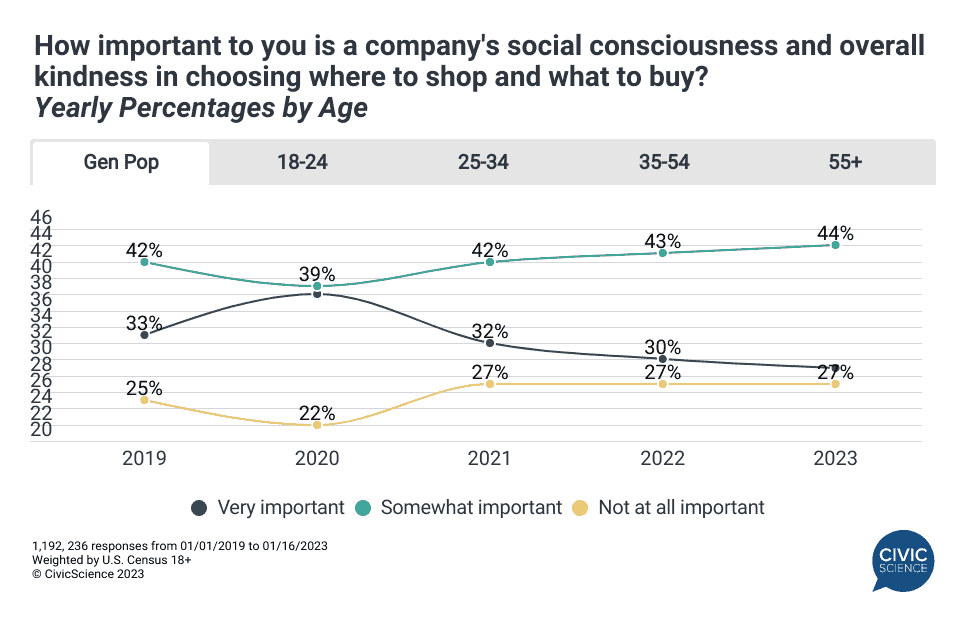
Barely half of us drink enough water. Forty-seven percent of Americans drink fewer than four glasses of water – less than the recommended daily amount – every day. Evidently, you can’t count the water content of Miller Lite, but I digress. There are interesting age breaks, though. Gen Z is not only the most hydrated generation, but the most environmentally conscious as well. Zs are the most likely to drink most of their water from a reusable water bottle, while Boomers are nearly twice as likely as Zs to drink from a reusable cup. I’m in the “other” category, with most of my water consumption coming from canned seltzer – also, beer.
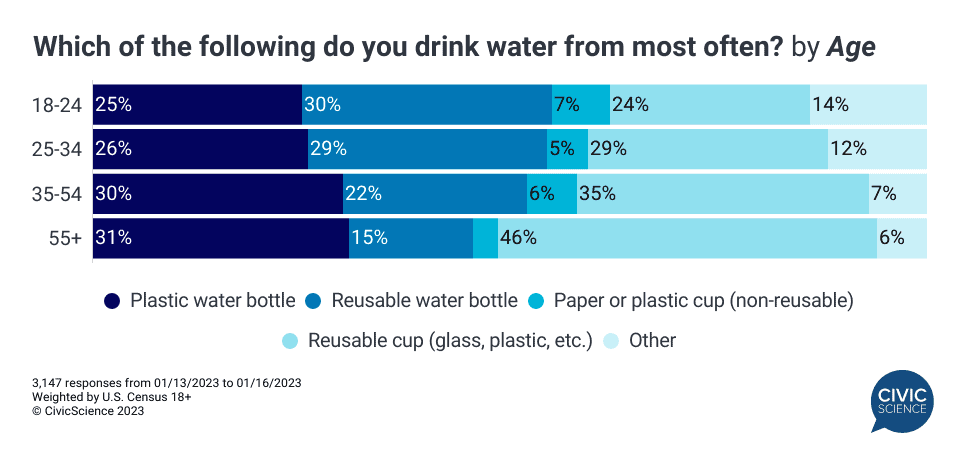
Speaking of Gen Z, they have been setting the pace in self-care since the start of the pandemic. I’ve written multiple times about their admirable commitment to and de-stigmatization of mental health, but we’re seeing Gen Z’s dedication to self-care manifest in all sorts of ways. Forty-three percent of them have used mindful meditation apps like Headspace, over 3X more than anyone 35+. Over one-fourth of Zs got a pandemic pet, now making them the largest pet-owning generation, because pets make us happy.
Tesla’s brand favorability is underwater for the first time. The polarity of Elon Musk has finally reached a tipping point over the past month, with the percentage of Americans who are unfavorable toward Tesla now outnumbering those with a favorable view. It’s important to note, however, that a clear majority of U.S. adults overwhelmingly consider Tesla the leading manufacturer of electric vehicles. It all screams of an opportunity for competition.
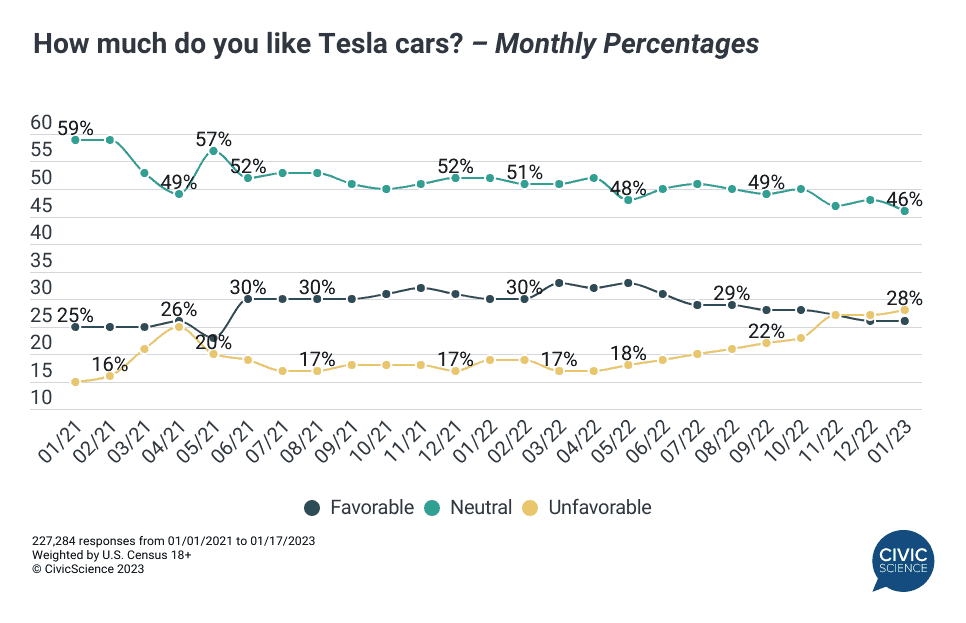
23% of Americans say they are at least somewhat likely to switch banks this year, the highest we’ve ever seen it. Six percent say they are “very likely.” The economic headwinds of the day seem to be a driving force, as people who report being worse off financially since the beginning of the pandemic and those who are unhappy about their credit scores are significantly more likely to switch. You can see 5 things you didn’t know about bank-switchers here for free, and thousands more if you ask for it. Turns out they’re disposed to switch all sorts of things.

Chris Cuomo called me fat on national TV. We also talked about hidden forces of tribalism – basically, all the stuff I wrote about here last week (and presented at CES). I guess it’s time for new material. And to lose weight, apparently.
More awesome studies from the CivicScientists this week:
- Democrats are way more concerned about a potential government shutdown;
- Americans are sleeping less, and it’s driving interest in tech products to improve their sleep;
- The favorability of ChatGPT is falling as people worry about its potential to perpetrate fraud at school and work;
- Conversely, Barnes & Noble is seeing a favorability renaissance.
The most popular questions this week:
- Do you typically stack dishes at the end of a restaurant meal to help out the server?
- Have you ever visited Graceland, the home of Elvis Presley in Memphis, Tennessee?
- What’s the absolute most you’d be willing to pay as a monthly subscription fee for a streaming service that you know you enjoy and want to have?
- How are your New Year’s resolutions going at this point in the year?
- Do you tend to tune in or tune out when an exchange becomes heated between a TV host and a politician?
- Have you ever found anything that surprised you when looking into your own heritage and family history?
Answer Key: Every time; No but I’d love to; $15; I went to Vegas on January 3rd, what do you think?; Tune in!; Nope, just a bunch of Dicks.
Hoping you’re well.
JD








